I mentioned in my post two days ago that my next article will be about traditional identity markers and who I might be in the future. After enumerating the traditional identity markers, I can only cover in this article the first part of the future projection of my identity, which has something to do with the reality of uncertainties in life. In the last article, I will cover the second part of the future projection of my identity concerning career interests and choice.

Traditional Identity Markers
Traditional identity markers include personality and character. These are considered the two most important identity markers. My character includes my interests. You can also add skills. Limiting the discussion of identity to these markers is necessary to prevent overcomplication and maintain relevance.
What follows is a reference to my previous reflective essay regarding self-examination or critical assessment of my personality and character, including my interests, as it contains the results of an objective assessment as well as my personal reflections. The paragraph below is the summarized section of my personality and character according to the Big Five Personality Test:
'You have a highly creative and imaginative way of thinking and you often see connections that others do not. You are uninterested in the dull facts of a situation, preferring instead to interpret its meaning and implications . . .' In my school experience, I am quite good in memorization. However, even when I excel in such areas of cognitive function, I dislike merely going by the book. So much that I hate history classes, especially when my professors merely read it as a fact and do not bridge it into the contemporary context. I like it better when people ask me questions—even questions that I do not know (Ashriel Edward A. Chavez, Inside Out: Unmasking the Self, unpublished essay, December 15, 2023,pp. 7-8).
The above paragraph reflects my introspective analysis of my cognitive style, preferences, and learning approach. I prefer a creative and interpretive way of thinking over rote memorization or superficial facts.
The next quote is a more structured personal analysis, where I mentioned both my strengths and weaknesses with an emphasis on their potential impact on personal development and community engagement. While my strengths seem promising, my weaknesses could be more critically analyzed to explore how they might be mitigated or transformed into opportunities for growth.
My strengths are: a creative and critical mind; submissiveness; goal-orientedness; and being open-minded. These traits can be further used for my self-development, and they can also affect the environment and the community that surrounds me. On the other end of the spectrum, my weaknesses are: being prone to self-doubt or being self-critical; being stress-intolerant; being competitive to the point where it may not work well in group scenarios; and isolation (Ibid., p.9).
With the foregoing considerations, I tend to gravitate towards a more thinking person rather than an emotional one. Cognitive-impelling discussions are likewise my forte. When it comes to interpersonal relationships, I prefer quiet and peaceful times more than an exhaustive outgoing social event. I tend to have a lot of friends easily, but choosing the closer ones is a rarity. Speaking more internally, I am vulnerable to being overly critical, often having a sense of doing more than what is required.
Lastly, my skills include writing, cooking, using various technologies, and gaming. In terms of strengths that can be fostered to develop skills, I am analytical and can organize data. I have also experienced bookkeeping and office work. My communication skills are also one area that can be developed further.
Who Might I Be in the Future? Uncertainties and Certainties
You might notice that I rephrased how the question is asked. “Who might I be in the future?"sounds quite pessimistic, but I would like to argue otherwise. Projecting the future and making it a reality takes more than the “will” to do so. There are uncontrollable factors that the motivated self cannot affect. These factors vary tremendously. It can range from financial constraints to unexpected life events or even trauma and abuse, which can be challenging even to the most carefully laid plans.
However, such uncertainties do not make the human task and effort devoid of value. Our choices, while not fully definitive, partially shape the future we want. To further give light to this, this journey with uncertainties can be well understood in the Christian worldview.
Uncertainties might look random, dreadful, or grim to our finite understanding. However, they are part of a divine plan with an ultimate purpose to bring glory to God. As Cornelius Van Til states:
There are no brute facts.
All of life’s events should be interpreted within the framework of God's sovereign plan, which we can understand when we look back at the Scriptures. Therefore, let us not be like the Stoics, who, in their wrestle with life's uncertainties, believed that human life is to be bold, calm, and unmoved—whatever happens, happens! They see life without the same glimmer of hope that we have through our faith in God's sovereignty—they overlook that the natural order operates under the works of one certainty that transcends all uncertainties—the Almighty God.
Posted Using InLeo Alpha